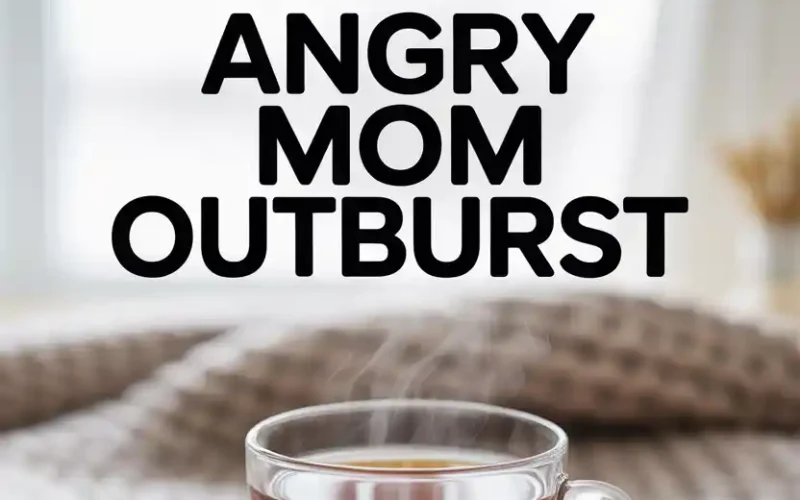Let’s be honest: losing your cool as a parent can feel like eating a jar of peanut butter with a spoon—regrettable and a little messy, but sometimes it just happens.
You love your children. You try your best. But on occasion, the volcano in your chest erupts and, suddenly, you’re auditioning for the role of “Yelling Mum” in the kitchen.
Now the guilt sets in, and you’re left wondering how to pick up the pieces (and possibly the Lego blocks). Deep breath.
Here’s how to recover after an angry mom outburst, without needing a time machine or a secret identity.
The Aftermath: Breathe, Pause, and Don’t Panic
You’ve yelled. Maybe you slammed a cupboard or muttered a few choice words into your tea.
The first moments after an outburst can feel like wading through treacle. Instead of stewing in regret, take a pause. Even if that means locking yourself in the loo for three minutes with your phone.
If you notice your chest tightening or your thoughts spiralling, focus on your breathing. A simple trick—inhale for four counts, exhale for six—helps reset your nervous system.
No complicated meditation app required (although Headspace is a favourite, if you need guided help).
This isn’t about punishing yourself for losing it. It’s about regaining enough calm to move from “fire-breathing dragon” back to “relatable, slightly frazzled parent.”
Repair is Better Than Perfection
Here’s the awkward truth: everyone loses their temper with their kids sometimes. Research from Harvard’s Center on the Developing Child shows that children don’t need perfect parents—they need parents who repair ruptures.
Translation: It’s not whether you occasionally snap. It’s what you do next.
Find your child, look them in the eye (or at least in the general vicinity if they’re under the table), and admit it: “I got really angry and yelled. I wish I hadn’t.”
You don’t need a grand speech or a PowerPoint presentation. Just your honesty.
Children learn emotional intelligence from watching us own up to our mistakes. When you model this, you’re giving them a template for handling their own slip-ups.
Name the Emotion (Yours and Theirs)
You got angry. No big mystery there. But kids aren’t mind readers. When you name your emotion, you help them understand theirs.
You can say, “I was feeling really frustrated when the milk spilled, and I shouted.” Not, “You MADE me angry.” That’s passing the baton of guilt, and nobody wants it.
Ask your child how they felt during your outburst. “Were you scared when I yelled?” Validate whatever answer they give—even if it’s “I thought you were going to turn into the Hulk.”
If they don’t want to talk, that’s fine too. The door’s open.
Apologise Without Grovelling
A genuine apology isn’t about flagellating yourself with guilt or chocolate wrappers. Keep it simple: “I’m sorry I shouted at you. I was upset, but it wasn’t fair to yell.”
Avoid throwing yourself under the metaphorical bus (“I’m the worst mother/father ever!”). Kids respond best to grounded, grown-up remorse.
You’re not seeking forgiveness to soothe your own conscience. You’re showing respect for your child and demonstrating that relationships can weather storms.
Look for Triggers in the Ruins
Anger tends to have a backstory. Maybe it’s a work email that landed badly, or maybe your toddler’s refusal to wear pants has crossed into week three.
Retracing your steps can help: What tipped you over the edge? Sleep deprivation? Hunger? The existential dread of stepping on a piece of Duplo?
Keep a mental note (or jot it on a napkin, if that’s all you’ve got handy). With time, you’ll spot patterns.
This is not about self-judgement; it’s about noticing what sets your inner alarm bells ringing. That way, you can intervene earlier next time—possibly before you start quoting your own mother.
Rituals That Help Everyone Reset
Kids appreciate rituals. And, let’s face it, so do adults. After the storm passes, introduce a reset routine.
This could be as simple as putting on a silly song (if “Baby Shark” soothes your soul, no judgement here), making a cup of cocoa, or taking turns saying one thing you like about each other.
One family I know keeps a stash of “Sorry Stones”—each person picks one when they need to apologise, a tactile way to mark a fresh start. It doesn’t erase what happened, but it signals, “We’re moving forward.”
Self-Compassion: The Secret Sauce
Research from Dr. Kristin Neff highlights the power of self-compassion in parenting. When you treat yourself with kindness after a meltdown, you’re less likely to stew in shame (and more likely to respond better next time).
This isn’t about excusing bad behaviour. It’s about recognising that you’re human, and humans have limits.
Try telling yourself, “That was a rough moment, but I can try again.” If you wouldn’t berate a friend for snapping, don’t turn that voice on yourself.
Repair Through Play and Connection
Children process big feelings through play. After you’ve apologised, find a way to reconnect that isn’t about words. Build a fort, make silly faces, kick a ball around the backyard.
Play offers a bridge back to normality, even if you both feel a bit wobbly.
Don’t underestimate the power of a hug, a shared snack, or simply sitting together. These small moments reassure your child that your love is bigger than your temper.
Set a Plan for Next Time
Now’s the chance to get practical. If the day’s stressors are stacking up like dirty dishes, consider your plan for getting through the next tricky moment
. Could you step outside for a minute if you feel your temper rising? Text a friend for backup? Use a code word with your partner that means, “I need to tag out”?
Teaching your kids coping skills is easier when you model them yourself. Next time you feel your fuse burning down, announce, “Mum’s feeling overwhelmed—time for a quick break.”
Watch how quickly your kids learn to press pause themselves.
Get Everyone Moving
Anger is a full-body experience. Movement burns off adrenaline and helps reset the system.
Turn on some music and have a one-song dance party. Go for a quick walk. Shake your arms out like you’re trying to flick off spaghetti sauce.
Don’t worry about looking daft—your kids already know you’re uncool. That’s part of your charm.
When Angry Outbursts Are Frequent
If you notice angry outbursts are happening more days than not, or your child seems anxious and withdrawn, it might be time to bring in extra support.
Chat to your GP, or check out resources from Raising Children Network, which offers evidence-based strategies and helplines for parents.
You’re not failing—you’re recognising a need for backup. That’s something to admire, not hide.
Small Steps Make a Big Difference
Every parent has moments they wish they could edit out of the family blooper reel. What matters is how you stitch things back together: with honesty, with a bit of humour, and with the willingness to try again.
Tonight, if the bedtime standoff ends with a shout and slammed door, remember: you’re not alone.
Apologise, reconnect, and trust that love is more powerful than any outburst.
Your children aren’t looking for perfection. They’re looking for you—real, flawed, loving you.
And that’s enough.




